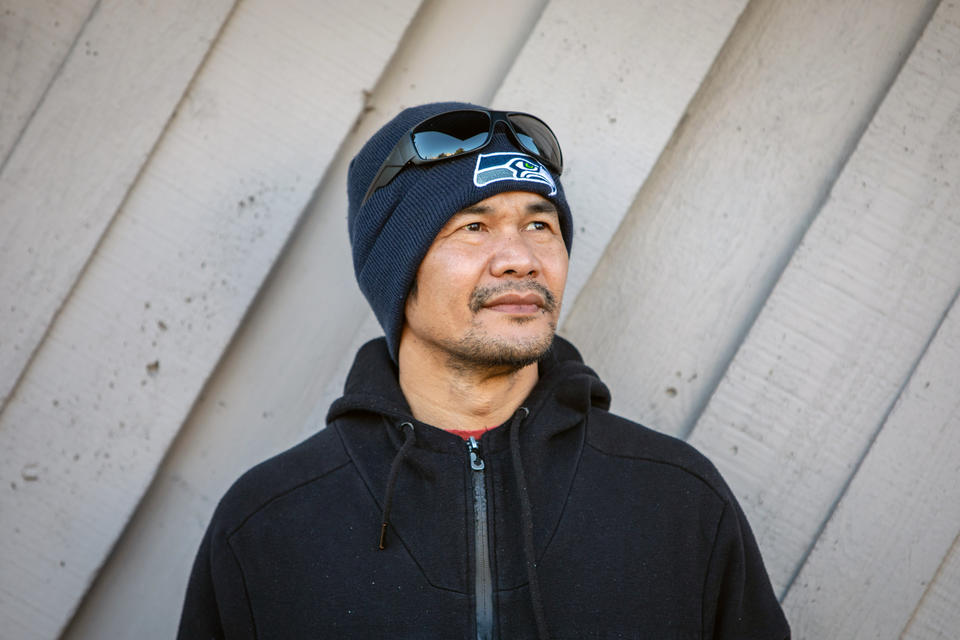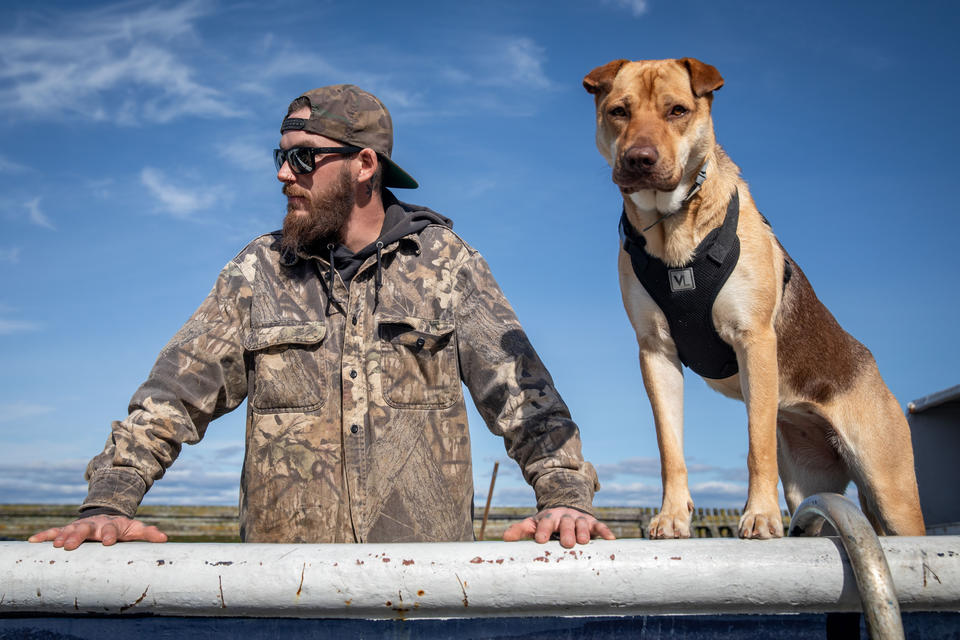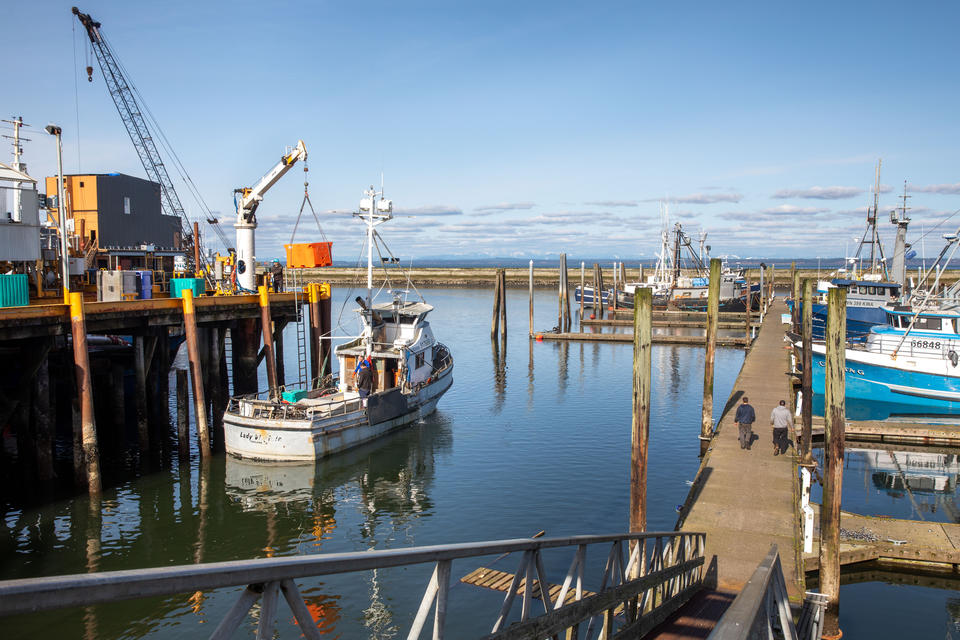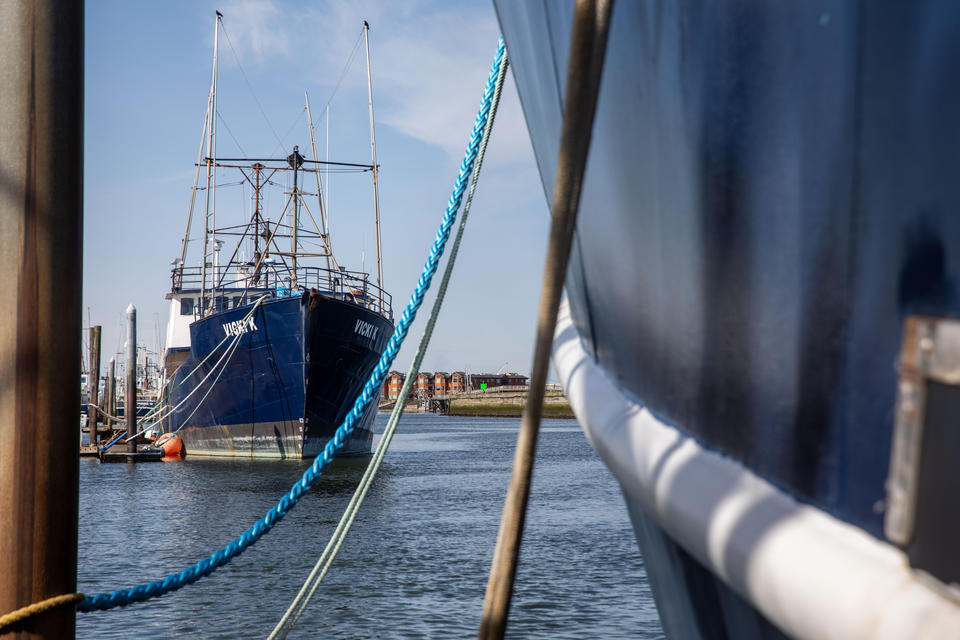Fishing companies say long waits between seasons can be common, but labor experts say offshore foreign workers are “uniquely unprotected” under U.S. policies.
By Lizz Giordano, Farah Eltohamy / Crosscut.com / March 27, 2024
Aboard the docked Svetlana M, Filipino seafarer Norberto Cabrela gently swayed to the waves. And waited.
As days turned to weeks then into months, everything turned to waiting. Waiting for his next meal. Waiting for the next phone call from his wife. Waiting for his pay. Waiting for the tuna he had caught to fetch a higher price. Waiting to hear if he could go home.
The boat, no bigger than five parking spaces in length, began to feel like aprison.
After a disappointing start to the albacore tuna season last spring, Cabrela and 23 other Filipino fishermen across several boats had spent late September, all of October and most of November docked in the Westport Marina on the Washington coast.
Each year, crews unload more than 100 million pounds of seafood at the commercial fishing hub tucked inside a cove of Grays Harbor, making it one of the busiest landing ports in the country. But between fishing seasons, activity slows and hours may pass without a boat coming or going.
As the birth of his son drew near amid the lull in work, Cabrela asked to go home. He wanted to be there for his wife’s planned cesarean. He said tests showed the baby’s cord wrapped around its body. Though not unusual, it was still worth treating with caution.
Cabrela and the other fishermen did not have visas to enter the U.S., so they all depended on their employer, California-based McAdam’s Fish, to arrange travel home. They could not legally step off of their assigned boats, even onto the adjacent docks, without risking a massive fine.
“Good day, sir,” began the text message Cabrela addressed to the company’s owner on Nov. 25. “I want to ask permission if I can go home. My wife will give birth in an emergency. There will be no one to watch over our little child … I look forward to your prompt response to my request. Thank you very much. Norberto Cabrela.”

Cabrela waited three days for a reply from owner Rob McAdam, according to messages shared. An answer he interpreted as a denial.
“It is very difficult to send people home at this time,” read the response. “There is a new chief customs agent that is now telling Jennifer that we need at least two guards for every person going home. Also, there is a new approval process. I appreciate everyone’s patience. … Thank you. Rob.”
Cabrela said he didn’t sleep the night his wife called to tell him she was heading to the hospital.
Labor experts say working offshore can leave foreign fishermen, coming to work at a U.S. company for higher wages, isolated and uniquely vulnerable to the interests of their employers. Even while tied to the dock, they can remain adrift in a murky zone of jurisdiction without a clear understanding of who is responsible for monitoring their working conditions.
The two dozen men in Westport had all signed initial contracts with the Filipino labor agency Pescadores International to work abroad. Pay stubs show the majority of their wages and advance pay were still missing long after they docked for the season.
The Svetlana M was one of more 120 vessels that international watchdog organizations listed as abandoned across the globe in the past year based on reports of stranded crewmembers or unpaid wages. All four of the U.S. flagged ships on that list were McAdam’s ships.
McAdam’s Fish told Cascade PBS the men could return home between seasons if needed, and that some men did go. They asserted that the men knew they might face long waits between seasons and were properly cared for in such times. McAdam’s also stated they made payments to Pescadores, who was then responsible for making sure the men were paid on time. A company attorney suggested the men’s allegations were a tactic to gain legal U.S. entry and work status.
The fishermen eventually connected with a network of Filipino-Americans in Western Washington, who alerted authorities. Three months after they first docked in Westport, U.S. Homeland Security led a multi-agency search on the fishing fleet in late December and launched an investigation.
While many of the workers returned home, Cabrela stayed behind in Seattle with five others, who dubbed themselves the “United 6,” to fight for their missed wages and assist in any ongoing investigation.
“It is hard,” he said through an interpreter, “but I will endure it so that I can fight for our rights.”
‘They don’t exist’
Cabrela, also known as Toto, a nickname given to him by his mother, said he learned of his wife’s pregnancy shortly after embarking on the first leg of his trip to the U.S. in April. He described it as a joyous parting gift as he made his way from Palawan, an island southwest of Manila, to fishing grounds off Washington’s coast.
About two weeks before he departed, Cabrela signed a contract with Pescadores International, a Filipino staffing agency authorized by the government’s Philippine Overseas Employment Administration, according to documents he shared.

Cabrela said he started working abroad in 2011. He joined some 10 million other Filipinos, more than 8% of the population, who left the country for better wages in 2023.
In Manila, he boarded a 12-hour flight to Vancouver, B.C., where he set off for the day-long sail to Westport in a McAdam’s boat. He had to take the route through Canada because he lacked permission to step on U.S. soil.
At sea, crews of three or four men often work 17-hour days. Videos shared by the United 6 show the men fishing under overcast skies, reeling in each albacore tuna one at a time by hand. Others show more fun times, where the men grill fish on the deck and make pancakes in the kitchen below deck.
McAdam’s uses what’s known as the “pole and line” method to capture the tuna, which measure about two feet in length. This method serves as one of the most sustainable fishing practices because of its low levels of “bycatch,” or unintentional catching of other species.
Crews stow their catch in a freezer in the belly of the boat, where they are flash-frozen. United 6 worker Mickel Mendez, who said last year marked his first fishing season overseas, learned much of this process aboard the McAdam’s Charlotte M.
“We see people going abroad get a better life for their family, so I grabbed the opportunity,” the father of six said through an interpreter, letting out a soft exasperated laugh. “All I wanted is to give my family a good life and have my children finish schooling and so I decided to go abroad and try my luck.”
After a season of high fuel costs, low fish prices and smaller total catches, the McAdam’s fleet returned to Westport to offload in late September. The United 6 fishermen said they were told to wait in the marina as the company hoped the price of fish would increase before the start of the next season in southern waters.
U.S. law does not require such fishermen to hold a visa, even while working for an American company. But without a visa, the men were confined to the boats. The fisherman said they were warned they could face a $5,000 fine – equal to nearly eight months of base pay – if they stepped onto the dock.
A 2021 U.S. Department of Justice report on human trafficking in fishing in international waters concluded foreign workers without visas “lack most basic labor protections and are unlikely to be in a position to report even extreme violations such as forced labor crimes.”
Cyrus Donato, a Puget Sound area inspector for the International Transport Workers’ Federation, which advocates for seafarers and monitors living conditions on board, said working without a visa can open the door to a variety of problems. The Federation reported the McAdam’s boats as abandoned after hearing the allegations of unpaid wages and stranded workers.
“These fishermen cannot physically step off onto the pier because they’re violating their visa or their lack of a visa, their lack of a status,” Donato said. “In the eyes of the government they don’t exist. … It’s absolute craziness.”
He compared the visa situation to the childhood game of “the floor is lava.”
“If you touch the floor, you get a $5,000 fine, and you’re shipped back to your country without receiving all your full wages,” he said. “It’s a really disheartening scenario, and the employers can use it, weaponize it, and it creates this asymmetrical power where they control access to the fishermen.”
‘Longer than normal’
During the wait in Westport, Mendez’s routine slowed as he spent many days alone. His boat’s American captain could come and go. Other foreign crewmen were already back home. So Mendez said he often woke late, skipping breakfast since he no longer needed the meal to fuel a long work day. Instead he cooked one big meal around midday, then ate the leftovers before bed.
Hours in between he often spent exercising, calling family or maintaining the boat. But much of the time he did absolutely nothing. His life came to a standstill – each day passing much the same as the last.

Videos capture the monotony of the time in a set of indistinguishable days and clips. Sea lions chattering on the piers appear in nearly all of the daytime videos. And a smattering of recordings show karaoke-filled nights, once to a sleeping audience member, in their kitchen.
“We just tried to look for something to do just like anything that will be for fun, like even sometimes cleaning the boat just to pass the time and not to think about the stress,” Mendez said through an interpreter.
The men described a frustrating and depressing time that left them feeling trapped. They said they did not know if they would be paid for this time as they continued waiting for a majority of the pay owed for their early season fishing in northern waters.
“When we contact the agency, the agency refers us back to McAdam’s and then when we call McAdam’s to tell our complaint, they refer again or point us back to the agency and so we don’t know what to do, we don’t know whom to contact,” Mendez recalled.
He said he spent a lot of time thinking about his family. Not being able to support them weighed heavily on Mendez. Every week, he said he asked if they are going back out fishing or if he could go home. At least in the Philippines he’d be able to work.
“They said they cannot let us leave because we signed the contract,” Mendez said. “But the contract I signed with them is only for six months. That is why I insist on telling them to let me go.”
For the past 12 years, McAdam’s Fish has worked with the overseas staffing agency Pescadores to hire Filipino crews without any complaints, according to Eric Sternberger, an attorney representing the fishing company. He said it’s expected that the fishermen will dock in Westport for up to a few months between seasons.
“This year’s gap was a little longer than normal,” Sternberger said in an interview with Cascade PBS.
The company expects the workers to serve out their contracts, he said, but if they have a good reason to go home between seasons, then they can.
“It’s an inconvenience and an expense,” he noted, “but one that would be paid for by McAdam’s.”
Sternberger said McAdam’s had started making plans to send Cabrela home, along with another crew member, but Cabrela canceled the request, according to a text message Sternberger shared dated Dec. 16 – four days after Cabrela’s son was born. The other crew member reportedly flew out six days later, nearly a monthafter Cabrela’s original request was sent.
Sternberger also said Cabrela had an active contract when he asked to go home. The attorney provided a second contract that started on Oct. 26 after the previous contract ended.
Cabrela said he never signed the second contract, which was stamped with approval from the Filipino government nearly two months after the contract’s start date. McAdam’s also provided a similar contract for Mendez, who also said he knew nothing about a second contract.
Sternberger also emphasized newly tightened Homeland Security policies, introduced last year, that prohibited fishermen without visas from leaving their vessels, visiting other boats or using bathrooms at the marina.
Offshore workers without visas often fall into a “no man’s land,” said Larson Binzer, an attorney and one of the authors of The Price of Paradise, a 2019 Georgetown Law School report that examined the exploitation of Southeast Asian fishermen in the longline fishing industry.
Binzer and other researchers found that contradictory federal policies further muddle oversight of the industry. While the U.S. Department of State outlines potential H-2B eligibility for offshore workers, the Immigration and Nationality Act excludes most foreign fishermen employed on U.S. vessels from eligibility for nonimmigrant visas.
This scenario leaves foreign crews dependent on their captains or the owners of the boat to provide all their basic necessities out of goodwill and not because they’re obligated to, she said, which can quickly become “problematic” and “makes the situation ripe for abuse.”
“There’s no human rights regulations, civil rights regulations, labor regulations that are forcing them to take care of these people because they haven’t crossed into U.S. soil,” Binzer said. “But they have a contract to be working on that boat just outside – literally steps – from U.S. soil on an American fishing boat, fishing in American waters for fish that are going to be sold in the U.S. market – so it’s really this complex scheme.”
Sen. Mazie Hirono, D-Hawaii, pushed in 2017 to improve protections for foreign fishermen after receiving word of 700 fishermen stranded on Hawaiian longline fishing vessels. Hirono introduced the Sustainable Fishing Workforce Protection Act, which would have created a distinct visa category for foreign fishermen and impose new inspection requirements. The bill died in committee – and Binzer said no similar efforts have been made since.
Buried in debt
Sunlight flashed through the early March clouds as cormorants perched on the long seawall that protects the entrance to the Westport Marina. The fishermen prepping their boats expected rain to return in the coming days. At the end of the southernmost pier, Anthony Green, recently a captain for McAdam’s Fish, worked alone finishing repairs ahead of the upcoming spring season.
Green, an American not affiliated with the United 6 group, said boats usually fish all year, but the last season ended early with the McAdam’s fleet missing the south season. Between the low price of fish and the high cost of fuel, Green said he lost money last year – his cut of the catch minus expenses left him at $56 in the red by the end of the season.
“I work, live, breathe, sleep this boat,” Green said as his sandy-haired dog, Aloha, peeked her head over the side of the boat.
McAdam’s responded that Green had worked just a partial season for the company as a replacement and had received his proper compensation.
The Westport Marina also attracts many Filipinos from Western Washington looking to fish. A tight-knit group of immigrants or children of immigrants, all of whom seem to fish, would become a crucial link to the outside world and to advocacy organizations for the Filipino seafarers.
The men had already spent nearly three months confined to their boats and received just a third of their earned wages, company records show. Coming off the boats, their top priority was ensuring they received their proper pay.
Mendez had gone abroad to earn money for his six kids’ school bills. His paychecks would have also helped pay medical expenses for his sister and mother-in-law after they fell ill. Without money to send their families for basic living expenses or medical bills, many of the men said they had to borrow money.
“We got buried into debt,” Mendez said.
About half of the wages owed the fishing crews came through on Feb. 8, more than a month after Homeland Security pulled the workers off the boats. The men calculated they are still owed between $3,000 and $5,600 each, for overtime and their monthly salary since they’ve left the boats.
McAdam’s attorney Sternberger told Cascade PBS that last season was also the first time the company heard complaints about late pay from crew they hired through Pescadores. (In 2018, a former captain accused McAdam’s Fish of shorting his contractual compensation, but a judge ruled there was not enough evidence to support the claim.)
Sternberger said the company made timely payments last season to Pescadores, who were separately responsible for paying the fishermen. The company said Pescadores provided them with deposit dates showing the men got paid about three months behind schedule.

“I don’t know why Pescadores’ schedule is the way it is,” the attorney said. “Had we known Pescadores was paying on the schedule they are paying, we would have made a change immediately. … It’s our presumption that people have been paid timely.”
Waterside search
As agents from the U.S. government descended on the McAdam’s boats for an unannounced search a couple days after Christmas, a message rippled through a group chat. United 6 worker Reyner Dagalea said he heard footsteps overhead as he worked on a drainage system below deck. He had spent weeks alone without the sounds of others on board.
“It’s very hard to be alone,” he said later. “What if something happened to me, bad, and nobody will know about it?”
The U.S. Department of Homeland Security boarded the boats after receiving a tip in mid-December, according to Coast Guard records dated Jan. 31 obtained by Cascade PBS. Those documents stated an investigation is ongoing with assistance from the Coast Guard, Customs Border Patrol, the U.S. Department of Justice Human Trafficking Prosecution Unit and local authorities.
Homeland Security and the Coast Guard declined to confirm or offer any details about the investigation.
Dagalea said he felt immediate relief when he realized who it was. The fishermen recalled agents interviewing each worker individually and offering assistance with getting off the boats.
The United 6 workers said they went with Homeland Security to a Tumwater hotel room. The other 18 foreign fishermen remained on their boats and McAdam’s reportedly repatriated them to their home countries a couple weeks later.
Foreigner workers alleging labor trafficking can qualify for what’s known as “Continued Presence” allowing them to stay in the country while their case is being investigated. That designation also comes with federal benefits and the ability to work in the country, and can lead to permanent residency.
The Center for Countering Human Trafficking approved 382 people for that status last year, according to a Homeland Security report released this month. The report also suggested the U.S. Coast Guard’s Pacific Division is taking new steps toward training its employees in identifying and responding to trafficking of foreign workers on U.S. vessels.
Sternberger with McAdam’s Fish sent Cascade PBS affidavits from 12 of the fishermen who stayed on with the company. Those documents largely mirror each other, with the men indicating they had received plenty of food while on board and high wages in past seasons. Some crewmen suggested the United 6 workers exaggerated claims in a bid to secure work permits.
“Based on those, we have reasonable belief this is a plan to get status,” Sternberger said. “We don’t begrudge anyone who wants to get status, [but] if what the other crew members are saying is accurate, then the United 6 has jumped the line ahead of other victims and immigrants who have a real strong interest to be here.”
Mendez, the first-time fisherman, said he decided to follow Homeland Security off the boat in the hopes it would lead him to being able to work here and send wages home.
“That’s the reason why we left for abroad,” he said, “to be able to help our family.”
A new wait
After a long day talking with representatives from the Philippine Consulate about the events of the past few months, Cabrela watched the last rays of light streak through the Seattle park near where he and the other United 6 workers have stayed in recent weeks.
The six men have settled into a small house in the city’s Central District, supported by a variety of Filipino organizations and a statewide anti-trafficking nonprofit. The men say they want to see McAdam’s and Pescadores investigated, as well as get help being repatriated back to the Philippines or provided with documentation to work in the U.S.
So a new wait begins.
Already early the next morning in the Philippines, Cabrela dialed his family over video chat. He spoke soothingly to his infant son’s image on the small screen and wrinkled his nose in hopes of coaxing a smile across thousands of miles of separation. His older daughter peeked out from behind his wife.
Cabrela still knows his 3-month-old son only through a screen. He’s never changed a diaper, prepared a bottle or given the baby a bath.
To pay for his wife’s medical bills and other family expenses, Cabrela said he recently pawned the title of a small lot – an investment he had spent years working abroad to purchase.
Cabrela said he is still waiting on an estimated $3,600 of back wages. He has until April to pay off debt and get a title to his land back. It’s where he and his wife planned to build a house and raise their kids.
“Just a small house,” Cabrela said. “So that I can go back to the Philippines, finally.”
FEATURED IMAGE: McAdam’s Fish’s boats sway in the Westport Marina in early March. The company’s 12-boat fleet spends the off-season docked in the marina. (Lizz Giordano/Cascade PBS)
Visit crosscut.com/donate to support nonprofit, freely distributed, local journalism.



